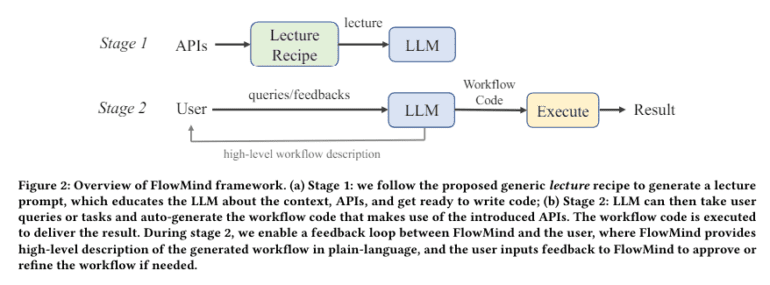- J.P. Morgan AI Research introduces FlowMind, a dynamic workflow automation system.
- FlowMind leverages Large Language Models (LLMs) like GPT to handle complex tasks securely.
- The system incorporates ‘lecture recipes’ to prime LLMs before task execution.
- FlowMind achieves exceptional accuracy rates, outperforming traditional RPA systems.
- User feedback is integrated for continuous refinement of workflows, enhancing accuracy and relevance.
Main AI News:
In today’s fast-paced industries, the demand for automation is ever-growing. However, traditional robotic process automation (RPA) systems often fall short when faced with tasks requiring flexibility and spontaneous decision-making. This challenge is particularly pronounced in sectors like finance, where dynamic workflow automation is crucial, yet traditional approaches struggle to meet the demands of non-standard tasks while maintaining high security and adaptability levels.
Existing research in RPA has primarily focused on rule-based systems such as UiPath and Blue Prism, which excel at automating routine tasks but lack the flexibility needed for dynamic environments. The emergence of Large Language Models (LLMs) like OpenAI’s GPT series has expanded the possibilities for dynamic code generation, paving the way for more adaptive automation solutions. However, there remains a need for robust systems that can effectively handle sensitive data and adapt to evolving requirements.
Introducing FlowMind, a groundbreaking system developed by researchers at J.P. Morgan AI Research. Leveraging the power of LLMs, particularly Generative Pretrained Transformer (GPT), FlowMind redefines workflow automation by incorporating ‘lecture recipes’ to prime the models before task execution. This innovative approach ensures that the LLMs understand the task context and API functionality, enabling them to handle complex tasks securely and efficiently without direct access to sensitive data.
FlowMind operates through a structured two-stage framework. In the initial phase, the system educates the LLMs on task-specific APIs through detailed lectures, providing necessary contextual information and technical specifics. This preparatory phase is crucial for equipping the model with the knowledge needed to generate and execute code dynamically in the workflow generation phase. FlowMind utilizes the NCEN-QA dataset, tailored for financial workflows, to train the LLMs effectively, ensuring their ability to handle real-world financial queries with precision.
The performance of FlowMind is nothing short of remarkable. In tests conducted on the NCEN-QA dataset, FlowMind achieved an impressive accuracy rate of 99.5% on easier tasks and 96.0% on more complex scenarios, surpassing traditional RPA systems by a significant margin. Moreover, the system’s ability to incorporate user feedback allows for continuous refinement of workflows, ensuring relevance and accuracy in real-world applications.
Conclusion:
FlowMind’s introduction signifies a significant advancement in workflow automation, particularly in the finance sector. By combining advanced AI techniques with a user-centric approach, FlowMind sets a new standard for handling complex tasks securely and efficiently. This innovation has the potential to reshape the market landscape by offering unparalleled accuracy and adaptability in automated workflow generation, catering to the evolving needs of data-sensitive industries.

